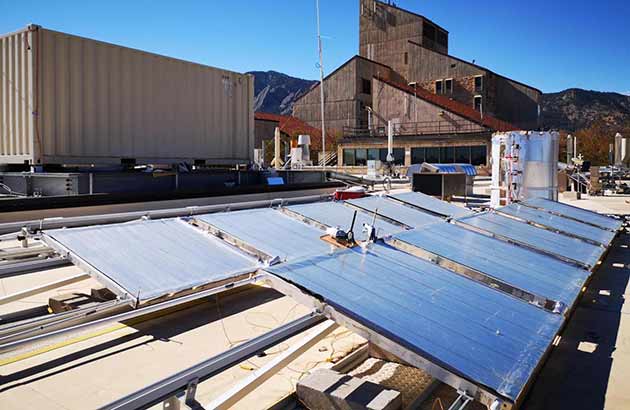Radiative cooling shows promise
30th October 2018USA: Engineers have created a full-scale water-cooling system capable of providing continuous day-and-night radiative cooling for structures.
The system is based on a film-like radiative cooling metamaterial developed by engineers from the Universities of Colorado Boulder and Wyoming, which first debuted in 2017. The system has been scaled into a 140ft² array—small enough to fit on most rooftops. When applied to a surface, the metamaterial film cools the object underneath by reflecting the sun’s rays back into space while simultaneously allowing the surface to shed its own heat in the form of infrared thermal radiation.
The advance could increase the efficiency of power generation plants in summer and lead to more efficient, environmentally-friendly temperature control for homes, businesses, utilities and industries.
“You could place these panels on the roof of a single-family home and satisfy its cooling requirements,” said Dongliang Zhao, lead author of the study.
“The material, which we can now produce at low cost using the current roll-to-roll manufacturing techniques, offers significant advantages.” said associate professor Xiaobo Yin of mechanical engineering and CU Boulder’s materials science and engineering programme.
The researchers tested their system outdoors in a variety of weather conditions, including wind, precipitation and humidity. In experiments conducted in August and September 2017, their proprietary RadiCold module is said to have kept a container of water covered by the metamaterial 20ºF cooler than the ambient air between 12.30 and 15.00, the most intense summer sunlight of the day.
The researchers also introduced an element of dynamic scheduling to their technology, anticipating that structures such as offices may have limited or no cooling demand at night. In a building-integrated system, however, a cold storage unit could be added to capture the cold through heat transfer fluid such as water in this system and allow it to be retrieved during the subsequent day to reduce the cooling strain during peak demand periods.
“We have built a module that performs in real-world, practical situations,” said Yang. “We have moved quite far and fast from a materials level to a system level.”
Related stories:
Scientists create film with cool benefits – 10 February 2017
USA: Scientists have developed a material which is said to be capable of cooling objects even under direct sunlight. Read more…








